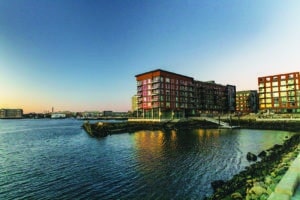
Lendlease’s 478-unit Clippership Wharf development in East Boston, completed in 2021. Boston officials say less than 3,000 housing units were approved in 2022, a fraction of the numbers in previous years, raising fears that the local rental market could be headed for a supply crunch.
Something is happening when it comes to the development of new housing in Boston, and it’s not good.
After a years-long boom, the number of apartment and condominiums getting teed up for construction in the city is falling.
City officials have given a green light to just 2,647 units in 2022, the Boston Planning & Development Agency reported Thursday in a rare correction issued by the agency.
That’s down from the previously announced figure of 3,247 new residential units, which the agency had reported on Dec. 30.
The new numbers represent a more than 60 percent drop over 2021, when the BPDA approved 6,643 units of new housing, and an even greater plunge from 2020’s 10,123 residential units.
Jesse Kanson-Benanav, executive director of Abundant Housing Massachusetts, noted the “real estate market is going through an adjustment” amid a pullback in financing for new projects, higher interest rates, and higher material costs.
And given Boston’s sky-high rents and prices, any pullback, let alone a major one, is bad news.
“Any decrease in the production of new homes in Boston is a major concern,” he said. “We have had a shortage of homes for years and shortage of homes at all income levels.”
Not the Only Sign of Trouble
Now, an argument can be made that the numbers are not as dire as they look.
After all, the giant Suffolk Downs redevelopment project won approval at City Hall in 2020, undoubtedly helping to put the number of housing units OK’d that year over the 10,000 mark.
The BPDA also approved the redevelopment of Charlestown’s Bunker Hill Housing project last year, which tacked a couple thousand units into that year’s tally.
But even after subtracting these big – and by their very nature, less frequent – projects, housing approvals still declined by a significant number in 2022.
It’s not the only sign of trouble, either.
Housing approvals by City Hall’s development arm are a somewhat forward-looking measure.
It can often take developers months or even years to break ground after winning a green light from the BPDA for a new tower or apartment building, due to additional reviews and the need to firm up construction financing.
However, building permits, which developers typically only pull when they are ready to start construction, are down as well.
Boston officials issued just over 700 building permits for new housing units during the second half of 2022. That’s roughly a third of the number of permits granted during the same period in 2021, according to data compiled by federal housing officials.
And no building permits were issued at all in November and December of last year.
Some Things Clear, Others Not
Surely a significant part of the slowdown we are seeing can be pegged to the headwinds new apartment and condo projects are facing across the country.
Construction costs are out of sight, interest rates have cut deeply into developers’ margins and banks and investors are growing increasingly skittish about lending money for new housing.
And let’s not forget the constant fretting by economists and pundits about the possibility, maybe even likelihood of a recession in 2023.
“I think there is a correlation,” said Aaron Jodka, director of research for U.S. capital markets at Colliers, adding that metro markets across the country are seeing a drop in new housing development as well. “The cost of capital has increased dramatically since the beginning of 2022, and that is causing challenges to investors as well as developers financing and creating new housing opportunities.”
Indeed, BPDA officials say around 13,000 housing units – half of them at Suffolk Downs – have been approved by the agency but have yet to start construction.
What’s harder to put a finger on is the role local factors – and in particular Mayor Michelle Wu’s bid to completely revamp of how development is done in Boston – are playing in the drop-off in new housing development.
Housing developments face new cost pressures from City Hall thanks to a proposal to boost the number of subsidized units in new apartment projects to 20 percent and increase the impact fees developers pay into the city affordable housing trust fund. City officials say these hikes would also come with a streamlined and more predictable permitting process, cutting down on some development costs.

Scott Van Voorhis
Nor has Wu given up on plans to unveil some sort of rent cap or rent stabilization mechanism this year as well.
Wu’s moves have definitely unsettled a segment, maybe even a broad one, of the real estate and development industry in Greater Boston.
But have the mayor’s moves upset the apple cart to the point that developers are pulling the plug on plans, as opposed to just fuming about the changes?
That’s less clear.
It’s certainly too early to give the last rites to Boston’s housing construction boom.
But whatever the cause, it’s becoming increasingly certain the years-long surge in new apartment and condo construction in Boston may be finally cooling off.
Scott Van Voorhis is Banker & Tradesman’s columnist; opinions expressed are his own. He may be reached at sbvanvoorhis@hotmail.com.




 |
| 
